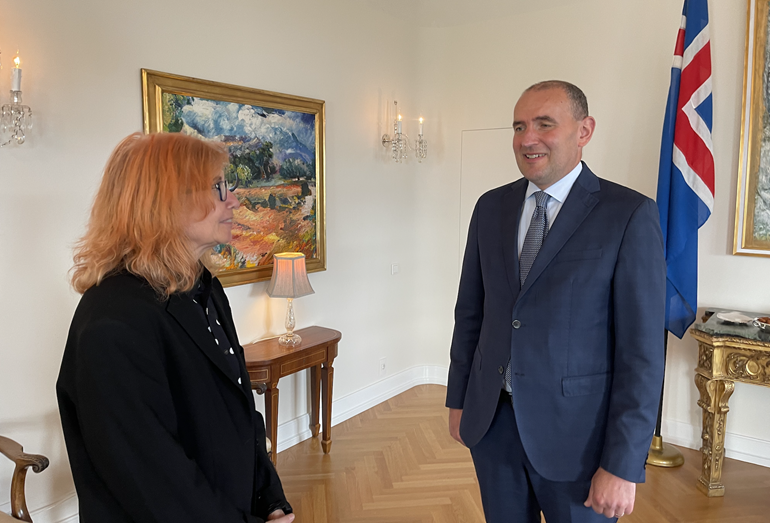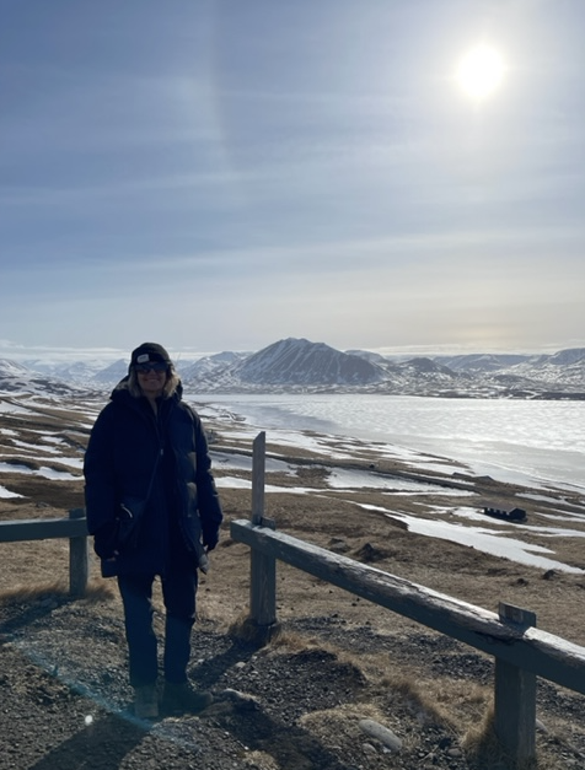
In 2022, Dr. Wanda Gregory was awarded two Fulbright scholarships: a Fulbright-National Science Foundation Arctic Research Award and a Fulbright Specialist Award.
In December, she completed the first grant, a five-month project in Iceland where she taught her favorite University of Washington Bothell course at Reykjavik University. She also conducted research on the potential of games and game technology to support the well-being of patients with Amyotrophic Lateral Sclerosis, or Lou Gehrig’s disease. The award, funded by the U.S. State Department and the National Science Foundation, provided her with travel, living and other expenses.
Gregory plans to complete her second award, a Specialist Fulbright scholarship for up to six weeks, later this year. She is currently exploring different programs and universities overseas to apply her scholarship.
The Fulbright program is a cultural exchange that aims to increase mutual understanding between the people of the United States and the people of other countries. More than 20 University of Washington students, faculty and staff have received the prestigious award over the past 10 years.
Inspired by illness
For most of her adult life, Gregory, now a lecturer in the University of Washington Bothell’s School of Interdisciplinary Arts & Sciences, worked in entertainment properties, including Wizards of the Coast, Hasbro and Xbox. Then, in 2006, she was diagnosed with breast cancer. “I guess you could call it a life-changing moment,” Gregory said.
While undergoing radiation therapy, Gregory created a character, or avatar, in the World of Warcraft to help her heal and ease her anxiety. In the popular online role-playing game, players embody personalized characters and are free to roam around and do as they please in the game’s colorful world, which consists of several virtual continents.
“I used my character in World of Warcraft for visualization,” Gregory said. “After my surgery and radiation procedures, I would play the game as a shaman troll character. I would embody the troll and go into this very peaceful online world.
“I would kind of walk around in the game and just think and imagine the energy from the radiation running through me … and killing the cancer cells.”
In 2007, Gregory’s cancer went into remission. Her work with immersive games during her illness inspired her to go back to school for her doctorate in 2010 to learn about the intersection of gaming technologies and health. She has since researched game technology in several wellness contexts, including its potential impact on pain management and phobias.
“My thesis was on the use of games and game technologies to help cancer patients — including women undergoing treatment for breast cancer — based on my own use of such technologies,” she said. “When the topic of ALS came up, I thought researching it and game technology could be really interesting.”
Playing for a better quality of life
In June 2021, Gregory traveled to Iceland in large part because it was one of the first countries to reopen after the pandemic shutdown. Over the course of that visit, she learned more about the country’s burgeoning game industry, which includes the popular game MMO Eve Online, and about the cutting-edge artificial intelligence and virtual reality labs at Reykjavik University. She was inspired to apply for the Fulbright upon her return.
When she was awarded the Fulbright-NSF award in March 2022, her aim was to study the use of games and game technologies for broader mental-health applications. On her way to Iceland in August, however, she visited a friend in Scotland who heads up research for the MND (motor neurone disease) Scotland ALS association — and a chat between the two led Gregory down a path that further defined her research plans.
“We were talking about the metaverse and VR, and then I started thinking, ‘Could you use VR to help quality of life for people with ALS?’” Gregory said. “From there, that friend introduced me to Gudjon Sigurdsson, the head of the Iceland MND ALS association.”

Sigurdsson invited Gregory to speak at the MND Information Day in Reykjavik the next month. Based on her experience with immersive games during her cancer recovery, she chose to speak on the potential of gaming technologies in supporting people with disabilities, including those with ALS.
“My talk was really well received, and so all of a sudden I found my research re-focusing on working with ALS,” she said.
Tech supporting communication and mobility
From August to December 2022, Gregory investigated how augmented reality, virtual reality, artificial intelligence and video games might be beneficial to those with ALS. She studied the emerging technologies and spoke both with experts and with those affected by the disease.
According to Gregory, the potential that games and game technology could have for patients with ALS is moot unless they can use the games in their current physical conditions. Therefore, she also researched games and game technologies that can be modified based on players’ abilities.
“This idea of making gaming more accessible is still new,” Gregory said. “Xbox and Sony have specially designed controllers that can be used by folks with disabilities, and other companies are coming out with new technology.”
For example, she looked into VR headsets that can track eye movement, such as Oculus Pro, to determine if ALS sufferers can use them to communicate more easily and use them completely after they’ve lost the ability to speak.
Talking and relaxing in a virtual world
“A lot of ALS patients ‘bank’ their voices before they get sick so they can communicate once they’ve lost their speech,” Gregory said. “They also use eye movement to type things which then allows them to speak through the computer with their voice — their real voice.”
She explains that patients can record themselves saying a variety of words and sounds before they lose speech in something called a “voice bank,” which they then can use to communicate once their ALS has become more debilitating.
“Maybe you’ve got really advanced ALS, and your grandchildren don’t feel comfortable around you. What if this technology meant they could go into a virtual world and communicate with your avatar?” said Gregory. “I looked not only into how game technologies could engage patients and improve their quality of life but also how it could prolong their ability to communicate with friends and family.”
Gregory also spent time considering how the ability to embody an avatar or just dive into an immersive virtual world might help ALS patients regain mobility, even if only virtually. “It could be a boon to their mental health,” she said.
Additionally, she researched VR meditation apps and their potential use for ALS patients. Oculus’ Guided Meditation VR, for instance, offers players their choice of more than 100 lush environments. Through guided meditation tracks and music, apps like this could help ALS patients relax their muscles and let their bodies rest.
Teaching “Black Mirror”
Alongside her research into the intersection of ALS and game technology, Gregory taught a class on technology ethics at Reykjavik University, one she has taught to UW Bothell first-year students for several years.
In Our Reflection in the Black Mirror, Gregory discusses the importance of being mindful of the potential dangers of technology, both existing and any technology students might create as designers. She centers the coursework around “Black Mirror,” the Netflix series that focused on technology and how it can alter societies and transform human behavior.
“It’s my favorite class to teach because it allows students to look at the ethical and societal issues around emerging technologies through the lens of Black Mirror,” she said, adding that while Black Mirror is futuristic, she and students also discuss current social media.
“It offers up interesting conversations for people to consider, including issues of privacy and surveillance and new AI technologies such as facial recognition technology and Chat GPT, an AI-run chatbot.”
Since beginning to lecture at UW Bothell in 2009, Gregory has taught senior capstones, portfolio classes and user-centered design, but when the professors at Reykjavik University learned about her experience with this first-year ethics-focused class, it was the one they wanted her to bring abroad.
“They were like, ‘we really want our students to understand the ethical issues around technology,’” she said. “I was in the computer science department there, and the students — from Iceland, Germany, Italy and Norway — were mostly studying artificial intelligence.”
On the right track
On another brief visit to Scotland in October, Gregory found that while there isn’t much public research on the topic yet, some sufferers of ALS are already using VR and gaming technology.

“I talked to family members whose relatives had passed from ALS, and they shared that their loved ones used VR headsets after hearing about it in ALS circles,” she said. “It was very validating for me because it showed that I was heading in the right direction.”
Knowing that her hunch has legs, Gregory has chosen to continue her research beyond the Fulbright-NSF award. She’ll be returning to Iceland during UW Bothell’s upcoming spring break to work more on this topic and plans to continue researching this intersection well into the future.
“I spent most of my time during this [last] Fulbright looking at ALS, and this is an ongoing project because it’s turned into a passion,” Gregory said. “I just want to help people. It’s a horrible disease. If I can find a way to help even a few people with ALS, I’ll be happy.”



